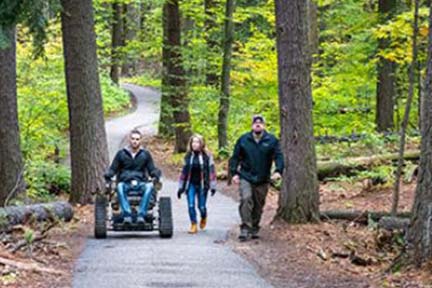
Grants for 31 Small Businesses Across Michigan

FOR IMMEDIATE RELEASE July 9, 2024 Contact: [email protected]
Gov. Whitmer Announces Grants for 31 Small Businesses Across Michigan, Creating 76 New Jobs
LANSING, Mich. – Today, Governor Gretchen Whitmer announced Michigan Strategic Fund (MSF) support for 31 small businesses across Michigan through the Michigan Economic Development Corporation’s (MEDC) Match on Main program. The $748,018.82 in grants awarded to small local businesses will create resiliency and strengthen downtowns in communities throughout the state.
“Michigan’s small businesses are the beating hearts of our main streets and downtowns,” said Governor Whitmer. “Today’s Match on Main grants will create 76 good-paying jobs and provide 31 small businesses across Michigan with the support they need to grow and thrive. Together, we are growing our economy and making communities across Michigan more attractive to live, work, and invest. Let’s keep working together to ensure anyone can ‘make it in Michigan.”
The grants are expected to create 76 full-time jobs and activate 8,835 square feet of vacant and underutilized space, with the projects expected to generate a total private investment of more than $2.7 million. Of the 31 awardees, 22 businesses are located within Geographically Disadvantaged Areas.
The Match on Main program serves as a tool to support new or expanding place-based businesses as they seek to launch and grow in core downtown areas and commercial districts by providing up to $25,000 in funding to support an eligible small business through a competitive application process. The FY24 Match on Main application window yielded a total of 113 applicants from 80 communities – the highest participation to date.
In February 2024, the MSF board approved $750,000 in funding to further strengthen Match on Main’s role as a foundational MEDC program, ensuring that Michigan’s small businesses will continue to succeed in the state.
“Match on Main is an important tool for place-based small businesses and communities across Michigan and serves as a catalyst in driving small business investment and growth opportunities,” said Amy Rencher, Senior Vice President of Small Business Services at MEDC. “Through the Match on Main Program, we’re not just investing in small businesses; we’re revitalizing communities and fostering economic growth one entrepreneur at a time.”
FY24 Match on Main Recipients Of the FY24 Match on Main grantees awarded, eight are new businesses and 23 are existing businesses, including 15 restaurants, nine retail establishments, five service businesses and two other businesses that demonstrate a commitment to revitalizing community infrastructure and boosting local employment.
In Alpena, the city awarded a $25,000 grant to Mangos Express for the creation of a walk-up counter and bar off the back of the building that faces an alleyway. The alleyway is being transformed into a pedestrian-only public gathering space in collaboration with the DDA, City of Alpena, and surrounding businesses.
“Our business will forever be positively impacted by being selected for this grant,” said Hugo Mendez, owner of Mangos Express. “We will be using this award to continue with the re-opening of Mangos Express, which will also provide our community with more job opportunities. Our number one goal is to always give back to our amazing community that has given so much to us.”
In the village of Stevensville, a $22,157.36 grant was awarded to Watermark Brewing Company to support the expansion of its beer garden. The development will transform a pre-existing blight property, enhancing the local downtown corridor and boosting the area’s appeal for residents and visitors alike.
“We are incredibly grateful for the support provided by the Match on Main grant,” said Chris Mason, co-founder of Watermark Brewing Company. “This expansion allows us to retain and potentially increase our workforce, ensuring that we continue to play a vital role in Stevensville’s thriving business community. Moreover, it positions Stevensville as a key destination for beer enthusiasts and tourists, further boosting the local economy.”
July 2024 Match on Main grantees
Michigan’s small businesses are a vital part of the state’s economy, employing more than 1.8 million people. Helping businesses to open and grow is a key focus of MEDC, and the Match on Main Street program provides opportunities for new and expanding businesses located in Main Street districts to grow and succeed. Get more information on the Match on Main program.
|








 Michigan is home to more than 13,400 miles of state-designated trails and local and regional options that offer something for everyone – there’s a reason we’re known as the Trails State.
Michigan is home to more than 13,400 miles of state-designated trails and local and regional options that offer something for everyone – there’s a reason we’re known as the Trails State.
 Just 30 minutes apart along the western coast of Saginaw Bay, Nayanquing Point and Wigwam Bay state wildlife areas offer some of the best birding opportunities anywhere in Michigan – and you’re invited to discover more about them during a free webinar next week.
Just 30 minutes apart along the western coast of Saginaw Bay, Nayanquing Point and Wigwam Bay state wildlife areas offer some of the best birding opportunities anywhere in Michigan – and you’re invited to discover more about them during a free webinar next week.
 The Michigan Natural Resources Commission will meet Thursday, July 11, in downtown Lansing. The day includes presentation of a Partners in Conservation Awards and DNR Parks and Recreation Division Lifesaving Awards, an update on the Brandon Road Project to prevent invasive carp movement into Lake Michigan, a discussion of proposed deer hunting regulations and a legislative update.
The Michigan Natural Resources Commission will meet Thursday, July 11, in downtown Lansing. The day includes presentation of a Partners in Conservation Awards and DNR Parks and Recreation Division Lifesaving Awards, an update on the Brandon Road Project to prevent invasive carp movement into Lake Michigan, a discussion of proposed deer hunting regulations and a legislative update.
 Cigarette butts, discarded food wrappers, pieces of plastic – all items we wish to avoid when we’re at the beach and have our toes in the sand.
Cigarette butts, discarded food wrappers, pieces of plastic – all items we wish to avoid when we’re at the beach and have our toes in the sand.
 See more pictures by
See more pictures by 

